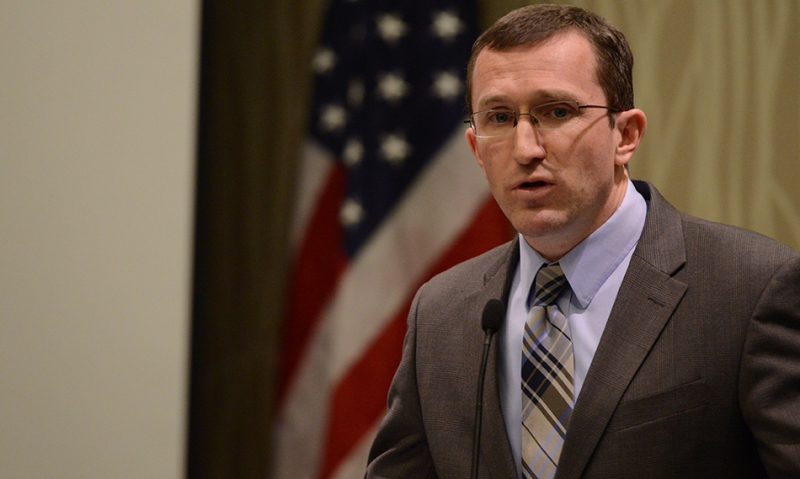
Waging war against war monuments
The senior counsel for the Becket Fund for Religious Liberty, Eric Baxter, briefed The American Legion's Legislative Commission on March 24 about the continuing war being waged nationwide against America's war monuments that feature crosses and other Christian symbols.
Groups such as the American Humanist Association argue that such symbols, located on state or federal land, violate the separation of church and state, which is mandated in the First Amendment’s Establishment Clause. These groups argue that such monuments should be removed or transferred to private property.
"Let's be honest. Crosses are not just a symbol of Christianity, but they are a widely known symbol of death and sacrifice," Baxter said. "History should be a reminder to us that we cannot see religious liberty just through the lens of our own religions." In America, "great discord exists on the importance of religion in public life" as society continues to weigh religious liberty against government interests.
"Not every situation is the same, and our effort is to urge the courts to consider carefully, and weigh always, what is the religious liberty interest, what is (its) sincerity and history, against what is the government's compelling interest in overriding that."
Noting that the Dalai Lama recently opened a Senate session with a prayer, that the Holocaust Museum contains Jewish religious artifacts, and some national monuments include religious rock drawings, Baxter said "to suggest that the government is trying to coerce us into Buddhism, or Judaism, or Native American religious practices because we preserve those things is truly ridiculous."
American history and culture cannot just be swept away, Baxter said, and religion inevitably finds its way into public life "and we shouldn't be afraid of supporting that and preserving that rich part of our history."
Across the country, many courts hear cases that involve war memorials with possible religious components. Baxter is currently defending the Knights of Columbus against a lawsuit filed in Montana to remove a statue of Jesus placed near a ski slope 60 years ago by veterans of the 10th Army Mountain Division.
Since the Jesus statue is located on National Park Service land, the Freedom from Religion Foundation in Wisconsin came to Montana and sued - after spending six months looking for a state resident who would join in the lawsuit.
"Now there's a huge controversy," Baxter said. "Ninety-nine percent of the community want (the Jesus statue) there. Religious or not, it's part of the community, it's a symbol."
One war monument in humanist crosshairs, according to Baxter, is the Bladensburg Peace Cross, emblazoned with the logo of The American Legion and erected in 1925.
Local citizens of Prince George's County, Md., wanted to put up a monument to citizens of the county who had died in World War I. People who donated to the project made the following pledge:
"We the citizens of Maryland, trusting in God, the supreme ruler of the universe, pledge faith in our brothers, who gave their all in the World War to make the world safe for democracy. Their mortal bodies have turned to dust but their spirit lives to guide us through life in the way of godliness, justice and liberty. With our motto, ‘One God, one country, and one flag,’ we contribute to this memorial cross, commemorating the memory of those who have not died in vain."
The pledge was hardly a statement of anyone wanting to impose a particular religious view, Baxter said. "Anyone can read that and respect the concept of people who have died for our country, and the gratitude to God that most Americans feel for those who have paid the ultimate sacrifice for their country."
What is to be done in these cases where war monuments and memorials are banned by courts that decide church-and-state separation has been violated?
"There's no easy answer," Baxter said. "The Supreme Court, in particular, has just messed up this doctrine so severely. It's a complicated history that we're going through, but there are some important principles that we can turn to decide these controversial cases." One principle is the fact that America is a pluralistic society "and we can live and work together, despite our religious beliefs."
Baxter said it is important for organizations such as The American Legion to remain active and informed on the issue, because cases like the Bladensburg Peace Cross "are happening all over the country, and wherever you are, you can be involved and aware....
"If you think about our founding, the abolition of slavery, the civil rights movement, all of these things were inspired - at least in some part - by religious belief. And our laws and our textbooks, our culture should reflect history accurately."
It is also important for The American Legion to remain involved in the litigation of war monument/memorial cases. "The willingness of organizations like yours to jump into these cases and provide another voice can be important."
The Legion plans to file a "friend of the court" amicus brief for the defendants in the Bladensburg Peace Cross lawsuit; it has filed amicus briefs in similar cases, such as the one involving the Mt. Soledad Veterans Memorial near San Diego.
At its 2012 national convention in Indianapolis, the Legion passed Resolution 281, which seeks to prohibit the awarding of attorneys fees in lawsuits brought under the Constitution's Establishment Clause.
In its resolution, the Legion noted that courts have awarded millions of dollars in attorneys fees for such cases, which must be paid for by taxpayers. The threat of paying such fees, the resolution stated, "is being used as a club to compel local elected bodies... to surrender to demands to remove or destroy symbols or expressions of a religious aspect from all areas of the public sphere... and is being used to chill private citizens from exercising the First Amendment right to seek redress... for fear that damages or attorneys fees will be imposed on them personally."
